Are you looking for a specific topic? Use the search function at the top right.
Sind Sie auf der Suche nach einem bestimmten Thema? Nutzen Sie die Suchfunktion oben rechts.
Wenn Sie unser Magazin kostenfrei abonnieren möchten, schicken Sie eine Mail mit dem Betreff FELD und Ihren Kontaktdaten an: feld@zalf.de.
Sie möchten die neuen FELD-Ausgaben lieber online nachlesen?
Dann registrieren Sie sich für den Newsletter auf unserem Online-Blog zum Magazin: www.quer-feld-ein.blog
FELD 01/2021
- Text
- Pandemic
- Corona
- Erosion
- Fertilizer
- Wind
- Crowdfunding
- Environment
- Dust
- Agoranatura
- Nature
- Leibniz
- Agriculture
- Climate
- Landscape
- Farming
- Soil
- Conservation
- Models
- Organic
- Agricultural
Interview REGIONAL OR
Interview REGIONAL OR GLOBAL SUPPLY SYSTEMS? Will the corona pandemic change agriculture? Dr. Piorr, Prof. Ewert, we remember the panic buying at the beginning of the corona crisis in 2020. Even though food supply in Germany has been ensured without restrictions, criticism against global supply chains is growing. Can more regional approaches make our agriculture more sustainable, more climate-adapted and also more resilient? Prof. Ewert: Overall, this is a comparatively new research field. In order to evaluate food supply in terms of sustainability, you have to look very closely at supply chains and their impact on the entire food supply system. If we shorten supply chains, i. e. rely more on regionally produced products, we can save transport costs, resources and CO2 emissions. But if we now would have to operate greenhouses as a result, which we would not need to do in southern regions, the avoided transport costs could be outweighed by the increased energy consumption, and the regional advantage would no longer exist. This example alone shows that it is always very important to look at the entire complex system for an evaluation. Dr. Piorr: Our experience, also from our international projects, shows that in the medium term a good balance between regional and global value chains will be important. In effect, this means developing regional systems in such a way that their advantages over the overall global system can be utilized. For example, they are more adaptable to local conditions. Moreover, and this is something we shouldn’t forget in the current pandemic: Climate change has to be considered at all times. Prof. Ewert: I agree and I would like to add one more point. If we think about regional systems—the fact that they are decoupled from the international market doesn’t necessarily mean they are necessarily more resilient to crises. Just think about the droughts of 2018 and 2019, during which an exclusively regional market would have led to enormous food supply problems. When we apply this to the challenges of the corona pandemic, we see the benefits of having a system that stands on two feet, so to say. The corona pandemic will change various areas of our lives forever. What development do you see, for example, in the case of further waves of infection and beyond? Prof. Ewert: If the situation gets worse, we can assume that, in the short term, politics in particular will focus on securing the food supply. We all remember the flights that brought workers from Eastern Europe to Germany despite the closed borders. Businesses upstream and downstream of agriculture would certainly be most affected, such as the processing and distribution of food. Agricultural production itself is less at risk, with an average self-sufficiency rate of around 80–90 percent in Germany, depending on the product group. The empty shelves had more to do with consumer behavior. As far as our research is concerned, the goal is clear, and it has not changed as a result of the pandemic: We need more resilient, sustainable agricultural systems in general. In other words, systems that, in addition to providing food and other ecosystem services, such as clean water or clean air, are also more robust in their response to climatic changes and extreme weather events. Biodiversity is also increasingly entering public awareness. What’s more: an often neglected service our agricultural landscapes are providing became much more apparent now because of the international travel restrictions: Rural areas are destinations for regional tourism and the demand for local recreation areas is increasing. Dr. Piorr: We are also following developments on a worldwide scale that give us a good impression of the challenges ahead of us: In Qatar, the food supply completely collapsed after just a few days as the result of a food embargo. In response they now construct greenhouses on a large scale requiring enormous amounts of water and energy. But Qatar also bought vast areas of land in Africa or made supply contracts with Canada for animal feed. The aim is also to 28 29
- Seite 1 und 2: FELD MAGAZINE OF THE LEIBNIZ CENTRE
- Seite 4: TITLE STORY NATURE CONSERVATION GOE
- Seite 8: AgoraNatura AgoraNatura NEW STANDAR
- Seite 12: GONE WITH THE WIND 3 11 15 Wind cre
- Seite 16: Soil erosion Soil erosion During fi
- Seite 20: Wind erosion Wind erosion WIND EROS
- Seite 24: Computer models Computer models On
- Seite 28: Computer models Computer models We
- Seite 34: THE BIG DIFFERENCE 13 14 15 In orde
- Seite 38: Organic farming Organic farming the
- Seite 42: Mission of the Leibniz Centre for A
Unangemessen
Laden...
Magazin per E-Mail verschicken
Laden...
Einbetten
Laden...
FELD (dt.)
Neu im querFELDein-Podcast
Would you prefer to read the new FELD issues online?
Then register for the newsletter on our online blog: www.quer-feld-ein.blog

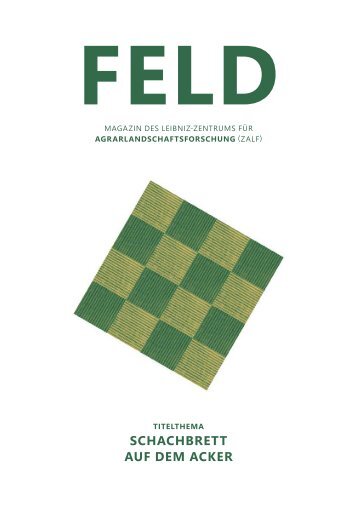
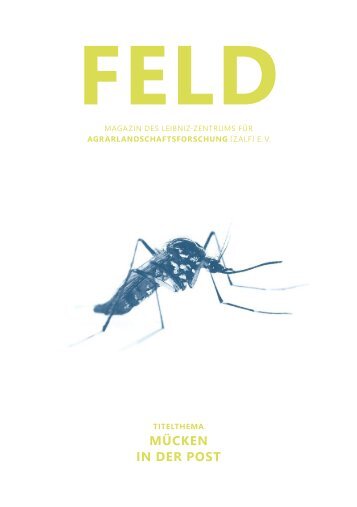
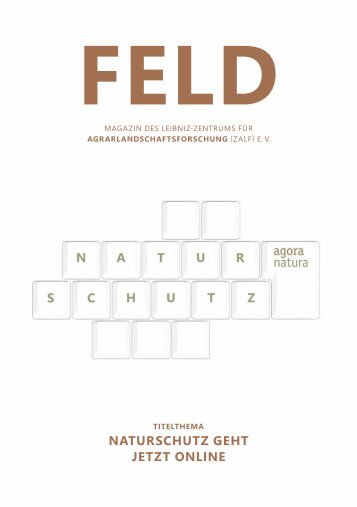
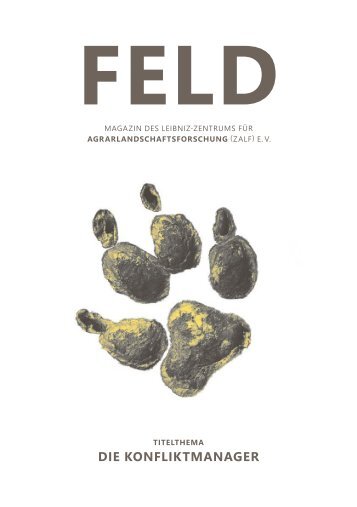
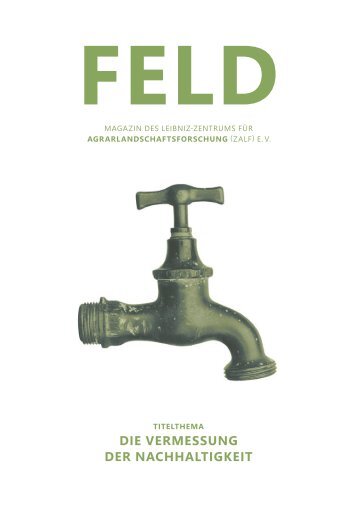
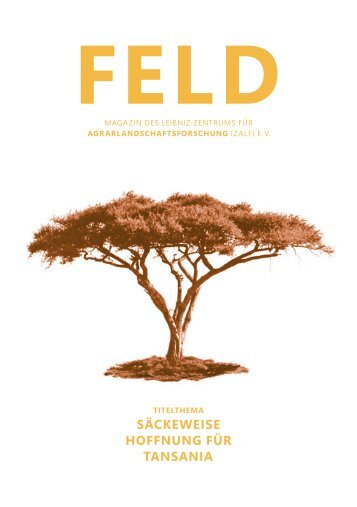
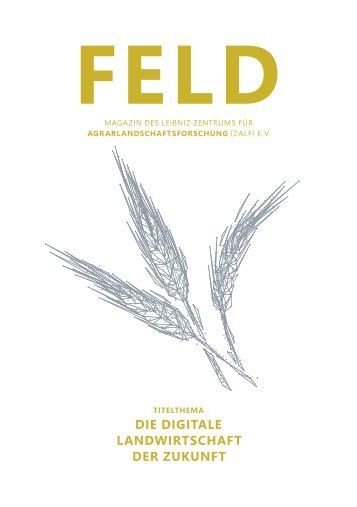
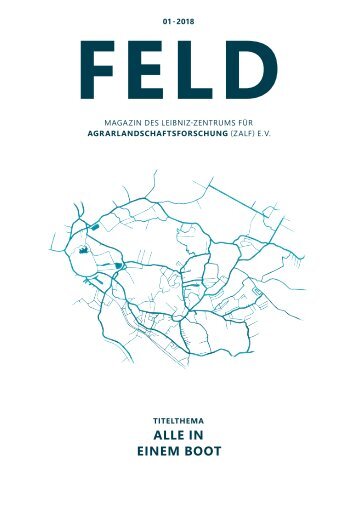
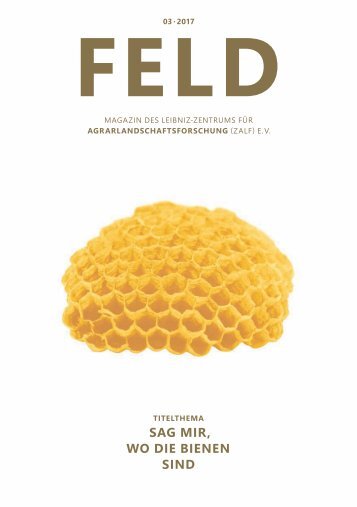
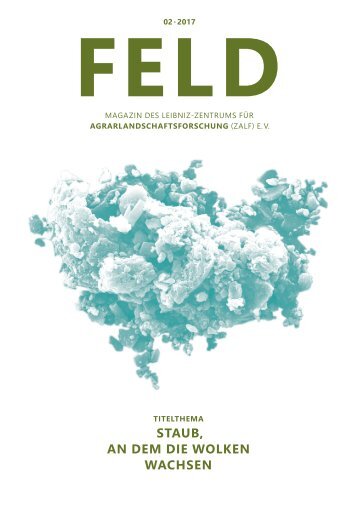

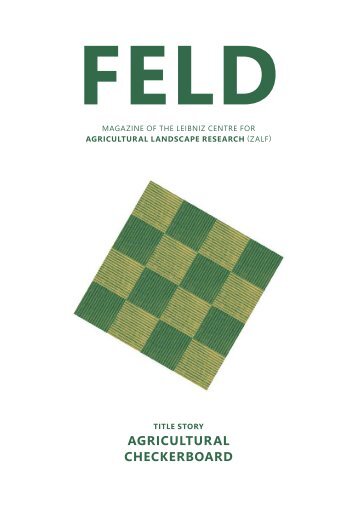

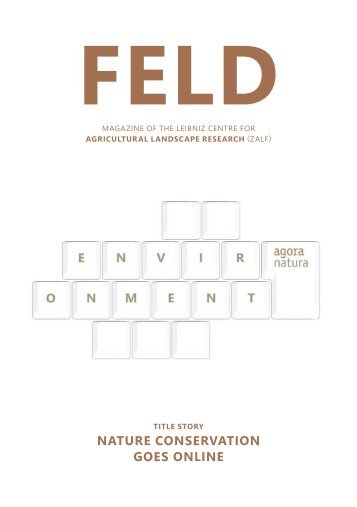








FOLLOW US
Twitter
Youtube
Instagram
LinkedIn